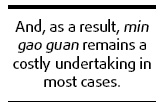Editorials
Law is not justice
(China Daily)
Updated: 2009-11-17 07:52
Two decades ago, when the national legislature passed the Administrative Procedure Law, we applauded, believing people would from then on enjoy an effective umbrella against power abuse.
The law made a lot of news for being the first on min gao guan, or private citizens suing State organs and their employees. That in a sense was revolutionary.
It still is, in the sense that civil rights remain weak in the face of the omnipresent and potent powers of the State and State functionaries. Protecting citizens from potential power abusers acting in the name of the State continues to be a serious concern in society.
| ||||
This has little to do with how the law was made, or what it stipulated on litigations against public offices or their staff. It is again a matter of implementation, as is true in the case of many other well-crafted legislations.

In practice, a good many lawsuits raised by private citizens against local governments or officials have effectively been throttled even before being put on file. In spite of the law's explicit stipulations, some local courts have found ways to raise the threshold for such cases to be registered and entered into the litigation process.
For instance, in the name of coping with the global financial crisis, some courts reportedly have decided not to accept cases involving labor disputes, real estate demolition and subsequent forced evacuation.
Given the courts' reliance on same-level governments for various resources, their pro-official preoccupation hardly surprises us any more. But a law is a law. After all, the law on administrative procedure should not just look good.
The Supreme People's Court's latest "opinions" on protecting litigants' right to action in administrative lawsuits are significant in that, once executed faithfully, they may at least prevent such an essential national law from continuously being bent.
Some courts might believe that keeping challenges against the authorities outside the courtrooms avoids embarrassing the latter and serves to maintain their fine image. But it does exactly the opposite. Suppressing people's complaints against officials' conduct may cause multiple harm, such as stigmatization of the court and the government, and deprivation of the sense of justice. The subsequent scene of "harmony" is self-deceiving, and bad feelings only acerbate as the courts evade their responsibilities for the maintenance of justice.
(China Daily 11/17/2009 page8)













